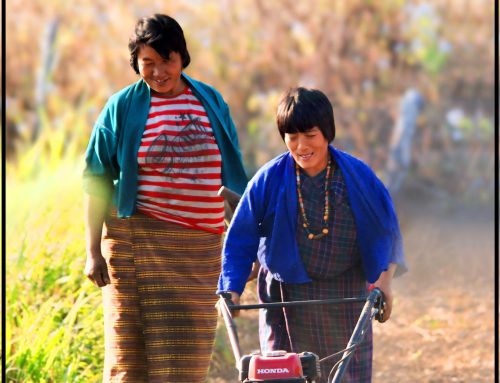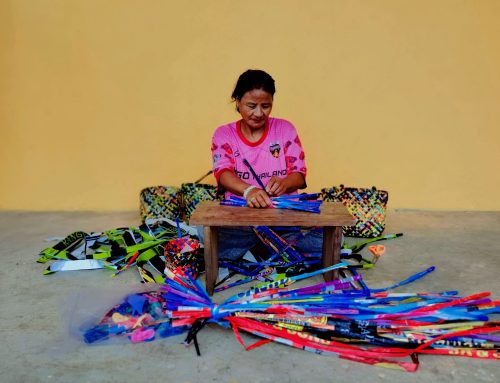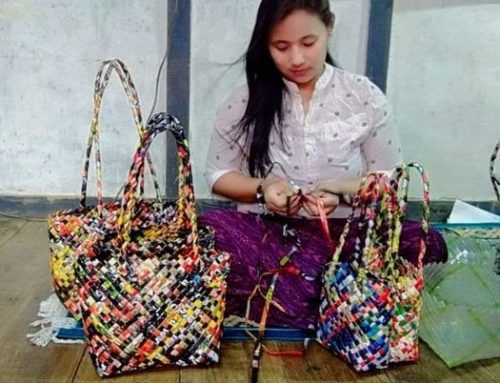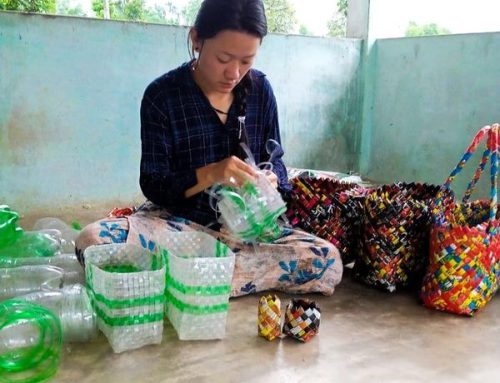COMMEMORATIVE DREAM: BUILDING MODEL VILLAGE, MENCHARI
Building a GNH Village at Menchari
Menchari is a village under Orong Gewog, Samdrup Jongkhar Dzongkhag, 12 km away from Dewathang and about half an hours’ walk from the road head. It is proximate to Aerong Mithun Breeding farm. There are 23 households (one empty) with 159 people of whom only 77 reside in the village (45 are students and 15 public servants with 22 family members). The village is electrified and almost every household has tapped drinking water. Although it is close to the road head, it does not have access road. It is one of the villages that is least reached.


Menchari village … Home of a family…
The community appears to be socially very close. It has fertile land that is largely cultivated. Maize is its staple crop. Livestock is also a source of livelihood. Menchari provides bulk of the labour force pool to Dewathang and its neighbourhood. People earn well from construction works but squander most of it in drinking.
Most of the people still live in thatched bamboo houses with roofs covered with banana leaves. Sanitation, hygiene, alcoholism and poor health (poor nutrition is a cause) are problems that fraught the village. People report of frequent deaths in the village (which they believe is due to evil spirits). A temple has been built to subjugate the spirits but remains incomplete.

The incomplete temple
The SJI has chosen Menchari to pursue a comprehensive development agenda with an aim to build a model village, a GNH village with people’s conscious support. In being inspired by the great opportunity, it is also mindful of the inherent challenges. Instilling people’s trust and confidence in themselves first and the SJI and its partners is critical. A sense of pride and dignity has to be nurtured in the people and it is not going to be easy.

Village leader addressing an SJI organized gathering
The SJI dedicates this project to the 4th Druk Gyalpo.
An SJI team (Team) made its first visit to the village on September 30, 2015. On November 1, 2015, the Team invited a doctor from Dewathang Hospital, his assistant and the Health Assistant of Orong Gewog to Menchari for awareness on various health issues, nutrition and general health check-up of the villagers. This was followed up by the first ever trainings on nutrition and waste management in the village.
Agriculture and nutrition, health (physical and spiritual -temple), access and income generation and saving are some of the strategies that the SJI and its partners will pursue. A youth-led program, which will engage students from the Gaeddu College of Business Studies, College of Natural Resources and Sherubtse College is in the process of being rolled out. This is also expected to provide space for Bhutanese youth to reflect and learn from the people.
Bhutan Centre for Media and Democracy is giving Nu. 1,20,000/- for the youth-led program.
Some details of the recent activities in/for Menchari are given below. It is a project that is expected to take a few years, as it involves changing mindset and behavior of people involved.
Details of activities
Awareness Program on Health, Sanitation, Alcoholism and Nutrition, 1st November, 2015
Coinciding with the coronation day of the 5th Druk Gyalpo, 1 November, 2015, the SJI in collaboration with the Dewathang Hospital (DH) and Orong BHU conducted an awareness program on the issues mentioned above.

A pigsty …common once upon a time

Thirty participants, 15 men and 15 women attended the awareness program. A lunch was prepared with local produce such as maize, pumpkin, sag, chili, and tea. Roasted maize was served with tea. People preferred rice over maize (irritates the throat as they complain; it is also (mis)perceived as poor people’s diet). Most people turned up voluntarily with their children for medical checkup.



 Doctor and the Health Assistant in Action
Doctor and the Health Assistant in Action
Training on Nutrition (healthy eating) and Zero Waste, 6/11/2015
Following the awareness program on health, sanitation, alcoholism and nutrition of 1/11/2015, training on nutrition was conducted for 18 farmers. Mr. Hari Prasad Pokhrel, Nutritionist-Dietitian at Samdrup Jongkhar Hospital was the trainer.
They were also sensitized and trained on waste management by the SJI Zero Waste team.
The trainings were conducted in the SJI office with 18 participants from Menchari village.


Mr. Hari and the participants at the SJI office
Training on nutrition
Nutrition is an area that requires greater attention from all concerned including people in general. As of now, it is perceived as the hospitals’ responsibility. The farmers were informed that nutrition meant substances found in food that maintained bodily function. Human body got nutrition from the food that people ate and drank. It was important to fuel the energy to work, growth in case of children and fight against diseases in the body.
The training covered:
- Types of nutrition: carbohydrates, protein, fats, vitamins, minerals, water and fiber.
- Eating suggestion: Good balance of carbohydrates, protein & vitamins
- Food pyramid
- Vegetable chopping technique
- Breast feeding
- Junk food and its effect
- Effect of processed food
Further the nutritionist presented them the benefit of eating healthy food like:
- Better school performance
- Prevention of over weight
- Prevention of chronic diseases
- Proper developmental growth
At the end of the training, the participants were given some tips in terms of healthy living by eating well all three meals with plenty of fruits and vegetables, never skipping breakfast and always washing hands before cooking and eating and after having gone to the toilet.
Zero waste program
The SJI Zero Waste Team conducted a brief awareness program on waste and zero waste craft making.

Life style and eating habits and waste production were inextricably linked. Hence, the awareness programs demanded greater coordination.
The principles of 3 Rs, segregation of waste at the household level, unhealthy waste disposal means impacting on environment and health, inculcating good habits such as minimizing packed tshog offering, carrying shopping bags, discouraging children from eating junk food, etc. were covered by the awareness program.
To create greater appreciation for waste reduction, waste situation in Thimphu now and the future and the recent clearing of dumpsite at Lamsorong, Dewathang were also shared with the participants.
The participants were also trained on craft making by the crafts women of Dewathang.

Learning to weave plastic bottles





